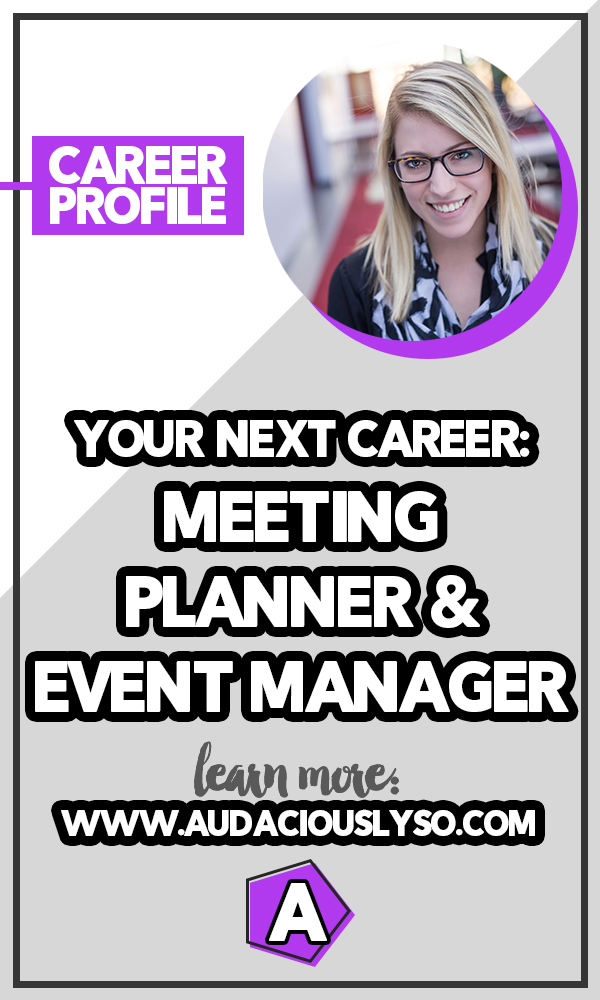| Kali A.
"As an in-house meeting planner for a trade association, I am responsible for the three member meetings held annually in April, August, and December at various locations across the US. I manage all aspects of the meetings from pre-planning to on-site execution including: development of event budget, RFP creation and disbursement, site visit, venue selection, contract negotiation, marketing strategy and implementation, registration, shipping, food and beverage needs, audio/visual needs, auxiliary events, staffing coordination, and on-site logistics."
|
Education
Required License(s)
None required, but I have my CMP (Certified Meeting Professional) and it certainly helped me get the job I have now. |
Required Degree(s)
Usually requires a college degree |
Importance of GPA

somewhat important
|
What do you need to do to maintain your license(s)?
You need to earn a certain amount of CEU (Continuing Education Credits) every 5 years to renew the CMP.
|
Kali's Highest Degree: Bachelor's degree
Kali's College Major: Business Administration - Marketing
Kali's College GPA Range: 3.6 - 3.9
Salary
The most recent salary survey said the average was around $75,000.
It varies greatly depending on location, amount of experience, management level, etc.
Getting the Job
How did you get your job?
I interned for the American Volleyball Coaches Association in college where I was assigned to the events. I fell in love with planning, so I decided that's what I wanted to do. The AVCA hired me full time after college. After 3 years there, I got my current job with AI. Employers are very focused on experience in this field. Skip the extra degree and do an internship where you get real event experience.
|
How important was networking to landing your position?
Somewhat important. Lexington is a smaller city so people are bound to have someone in common.
|
Life on the Job
What is a typical day (or week) for you like?
If I'm in the office, it's working at my desk answering emails, planning out event details, or on the phone with hotels or vendors. If it's an event week, we are on-site running everything. It's long hours but so much fun. If it's a site visit, I'm in a city alone touring hotels, restaurants, etc. Those are the most exciting since the local representatives show you the best the location has to offer!
|
How closely does your typical day (or week) match up to the general "job description" for your position?
Very close
|
Does being a woman affect any aspect of your career?
In my current position and at my specific company, no.
|
What is the best thing about your job?
Traveling around the country and touring locations I would not be able to visit personally. Also, getting to execute experiences for other people and seeing their reactions—it's very rewarding to see it all come together.
|
What is the worst thing about your job?
A lot of planners complain about long hours. My current position is very fair about hours. Actual event days are long, but those are only 3 weeks a year.
This job does tend to put you in high-stress environments and forces you to make quick decisions on your feet. |
How demanding is your job?
My specific job is good with managing time. They know we work hard when we have to, so they are flexible at other times (not all companies are like that). If time is a big issue for you (maybe you have a family), I would suggest trying to find a small company that really cares about their employees and values what's important.
Again, there is some stress with this job, mostly on-site. But if you have a good team around you and can be decisive in stressful moments, it's not bad. |
Do you have any advancement opportunities?
It depends on the company, I would say. I'm a single planner here, but some companies have teams of planners. In that case, you could move up to manage a team. Otherwise, you may have to move companies to achieve a higher title or better pay.
|
Advice for You
What are the skills, characteristics, or talents that are most important to be effective in your position?
|
What advice would you give to someone thinking about pursuing a career like yours?
If you want to do something that is unique and challenging, this is a great field. The benefits and perks FAR outweigh the stresses.
|
If you could do it over again, would you still pursue the same career?
Yes
|















